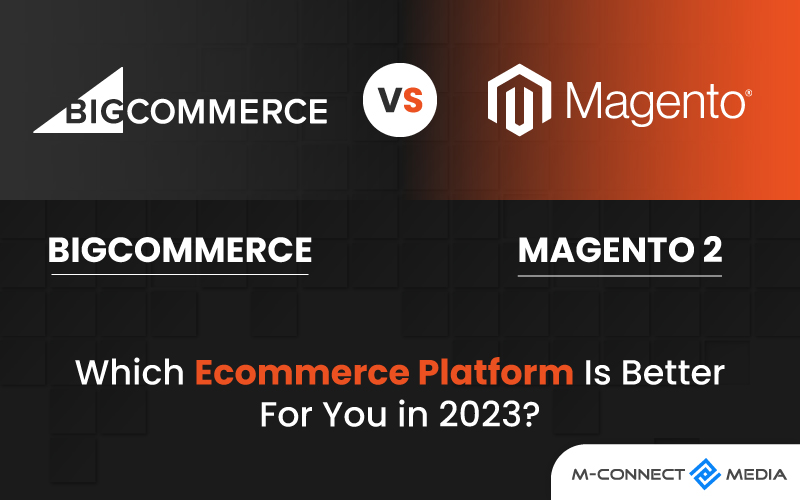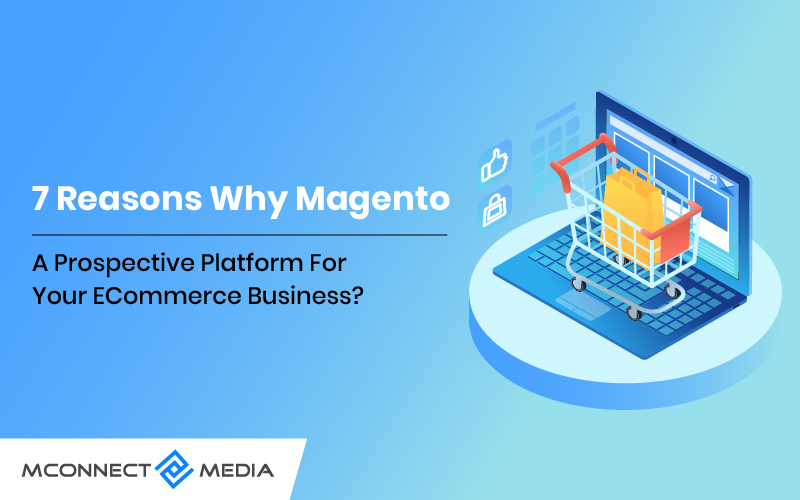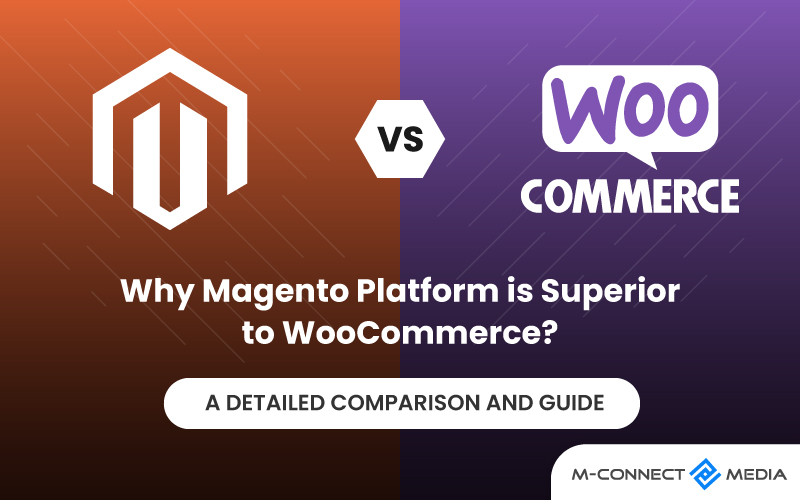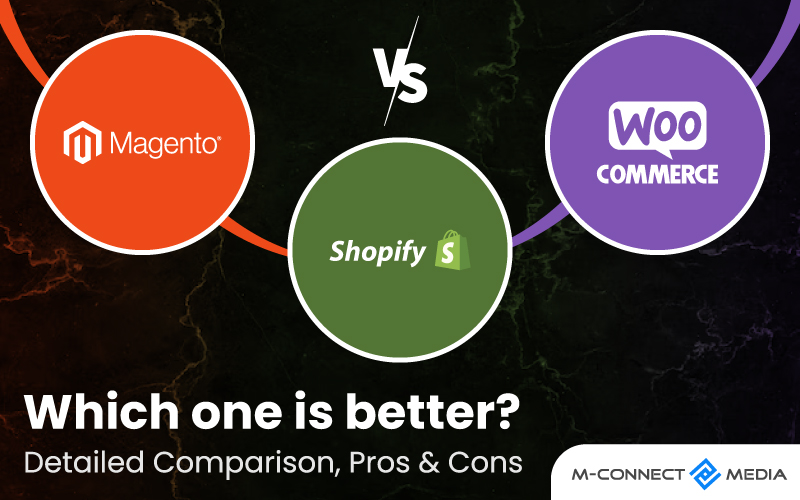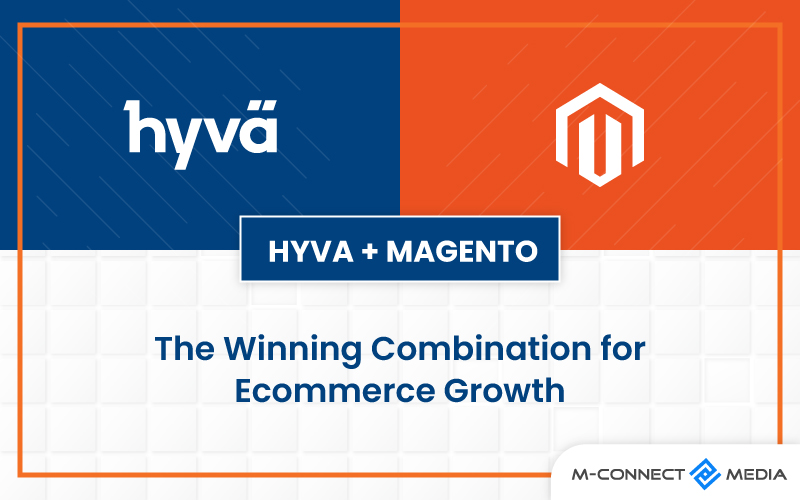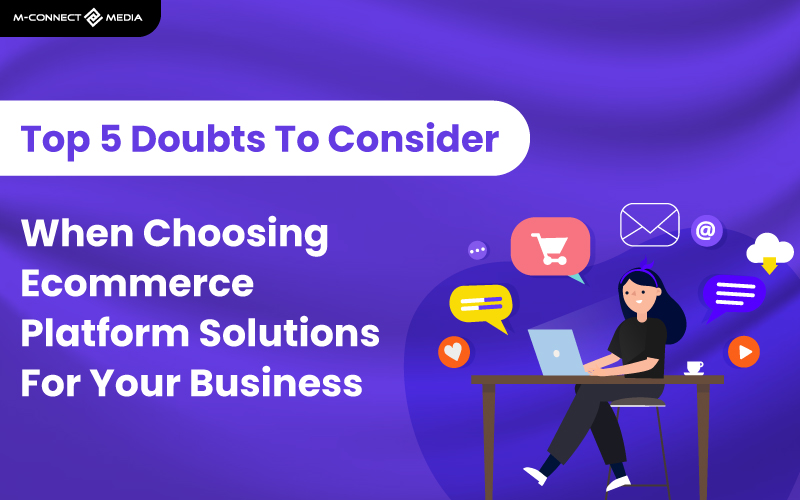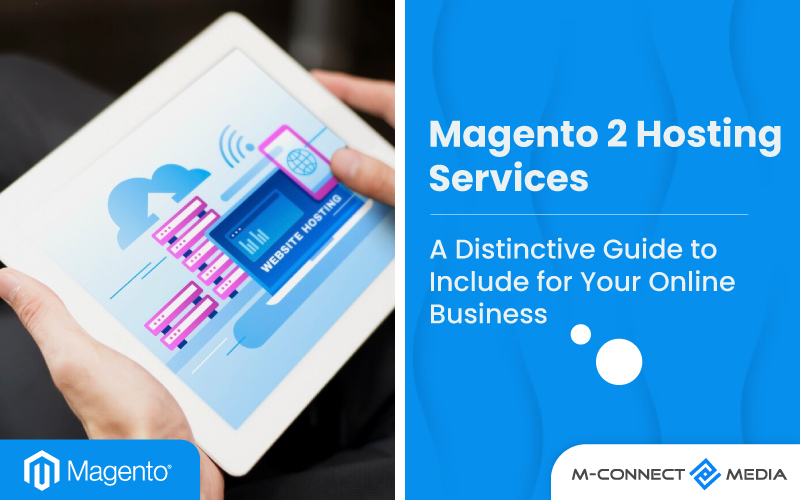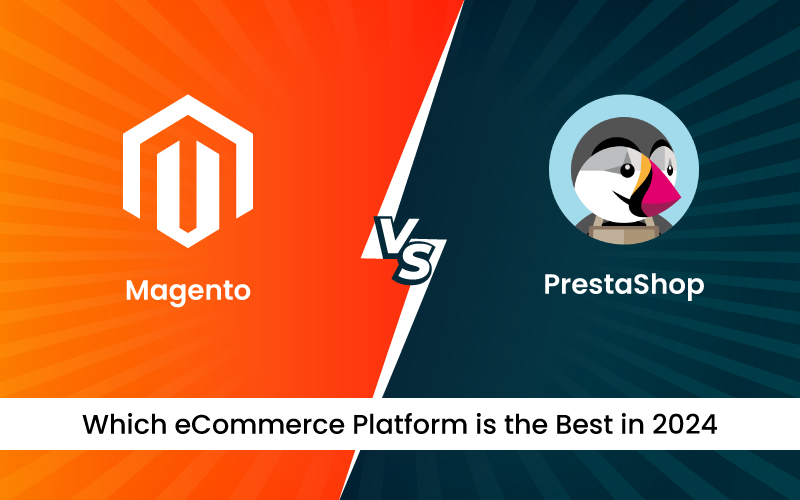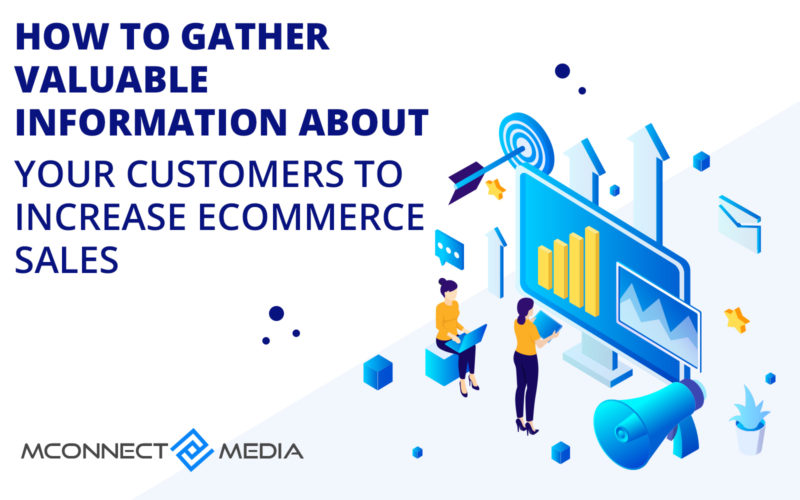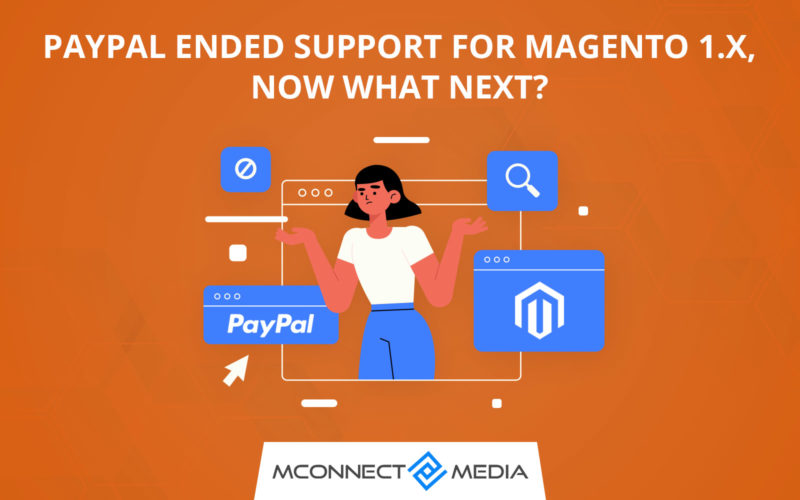When choosing the right platform for your online store, you might think about BigCommerce vs Magento 2. These are popular options for people who want to create and manage online business. But how do they compare to each other?
BigCommerce and Magento 2 are well-known platforms used by businesses worldwide. But which one should you choose? Choosing between BigCommerce and Magento might be a bit tricky. To decide, you’ll need to look at their features, cost, security, and more.
These two Platforms will assist you in creating and selling through an internet store. Both can help you start eCommerce journey and offer lots of ready-to-use features to make online selling engaging. But how can you determine which one is the best fit for you?
Are you having trouble choosing between BigCommerce and Magento 2 for online store? Don’t worry, in this article we’re here to help you pick the right platform for business. We’ll also help you make a smart choice that fits your business needs.
What is BigCommerce? An Overview
BigCommerce is like an online shop builder for businesses. It started in 2009 and different types of companies, from small to big ones, like to use it. It is an all-in-one Ecommerce platform that around 62,000 stores (like ConnectPOS) use to make managing online stores easier.
BigCommerce comes with various features for Handling products, Improving SEO, marketing, and safely connecting payments. It offers a seamless experience for online stores, supported by a helpful community and dedicated assistance. Moreover, Lots of big companies like Toyota, Sony, and even Ben & Jerry’s ice cream use BigCommerce to sell their stuff online.
With its user-friendly interface and solution, businesses can easily create and customize online shops. It connects with famous places like Amazon, eBay, and Google Shopping! So, if you want to sell things online, BigCommerce is like a cool friend that helps you make your shop and take care of it!
What is Magento 2? An Overview
Magento 2 is like a special toolbox for making online shops! More than 267,000 stores around the world use it to sell things on the internet. It started in 2008 and now it’s one of the most popular ways for online stores and marketplaces. It has a free version called Magento Open Source, and a fancier one called Magento Commerce.
Adobe Commerce (Magento) is an open-source platform with special kind of tool that’s free for everyone to use. It’s really good for making big online stores and businesses. People can make it work just how they want by changing and customizing lots of things.
Magento 2 has lots of helpful things to help you run business. It’s good at working fast and look nice, whether you’re on a computer, tablet, or even a phone. Many well-known brands, like Ford, Coca-Cola, Hermes, and Nike, use the Magento platform to build their websites.
Also Read: Must Consider Magento 2.4.6 Release Notes Before Migration – Key Features
BigCommerce Vs Magento: Pros and Cons
Before we get into detailed comparison of BigCommerce and Magento, let’s look at some of the broad Pros and cons of each Ecommerce platform.
BigCommerce
Pros:
- Great for selling in many places, like Facebook, Instagram, and Pinterest.
- Helps your business show up high on Google and Bing searches with good SEO tools.
- Comes with lots of features, more than other similar options.
- 24/7 phone and live chat support
- Doesn’t make you pay extra when customers buy things.
- Awesome online store abilities, like selling in different money types and telling people the cost of shipping right away.
Cons:
- Doesn’t have a mobile app, so it’s not easy to manage store when not at computer.
- Some parts of the editing area might be a little hard to figure out, and finding certain things could be tricky.
- The builder sometimes uses fancy words that might be tricky if you’re not so good with tech stuff.
Magento
Pros:
- Helpful info in knowledge base and FAQs to solve problems.
- Extremely expandable, with all the inventory management capabilities
- Large Extensions community and a diverse commerce
- Scalable for expanding companies
- Free version available
Cons:
- No 24-hour assistance
- Fees involved to add extension features and functionalities
- Difficult to set up and utilize
- Might be difficult for beginners
- Technical expertise and resources are required for customization
BigCommerce Vs Magento 2 Platform: A Detailed Comparison
The big difference between Magento and BigCommerce is how you use them. Magento is like a special toy that you need to set up yourself, while BigCommerce is more like a ready-to-play toy. Even though Magento is a bit more expensive, it’s more popular than BigCommerce.
Also Read: 7 Reasons Why Magento A Prospective Platform For Your ECommerce Business?
Now, let’s take a look at what cool things you can do with Magento 2 and BigCommerce.
1. Features
Online shopping platforms, like Magento 2 and BigCommerce, were made to give you lots of good things and help business get bigger. They have features already built into them that you can use right away.
BigCommerce
BigCommerce easy-to-use online store platform has lots of tools already in it to help you set up and run online business. It has things like a quick checkout, lots of products you can add, websites that work on different devices, and you don’t have to pay extra for each sale you make. BigCommerce also gives you many tools and ways to make store better.
Magento
Magento is a platform that you can change and make flexible because it’s open-source. It comes with lots of built-in things like a special checkout, ways to pay and send things, managing your products, and fast buying. Magento is also powerful, but you need to know more about how things work to use it.
2. Hosting
Hosting is the most significant distinction between the various solutions. There are many things to think about when comparing Magento 2 and BigCommerce for hosting. Let’s take a look at the hosting features of both platforms:
BigCommerce
With BigCommerce, hosting is included as part of the service, so there’s no extra cost. This is a good choice for businesses that want an easier way to run online store. It manages the servers, keeps things secure, and makes sure everything runs smoothly. But remember, you can’t pick own hosting provider with BigCommerce.
Magento
Magento 2 is a platform that you host yourself. This means you have full control over where website is hosted. You can choose own hosting provider and set up the server the way you want. This gives more control and the ability to customize things. Magento is open-source, it means that shop owners need to take care of hosting and security.
3. Pricing
Pricing is an important consideration when selecting an ecommerce platform. Both Magento vs BigCommerce systems offer distinct price strategies based on the demands of the business. Let’s have a look at the pricing options provided by these eCommerce platforms:
BigCommerce
BigCommerce has four different prices you can choose from, depending on how big your store is and what you need:
- Basic Plan ($29.95/month): This plan is great for beginners or small businesses. It’s good for up to $50,000 in sales online each year.
- Plus Plan ($79.95/month): This is good for medium-sized businesses. It has extra things like different customer groups, dividing customers, and saving abandoned carts. It’s good for up to $180,000 in sales online each year.
- Pro Plan ($299.95 per month): This plan is for big companies. It comes with advanced stuff like Google reviews from customers and a special way to search. It can also handle over $400,000 in sales online each year.
- Business Plan: This plan is for businesses that are growing really fast. It has everything from the other plans, plus more power and great help.
So, you can pick the plan that fits what you need for your online store!
Magento
Magento has three editions. Here are the Magento Commerce all editions price details:
- Magento Open Source (Community Edition): The Open Source version of Magento is free, but you might have to pay for hosting and other things.
- Magento Commerce Edition (Hosting): The price for Magento Commerce isn’t the same for everyone, and you have to talk to Magento to get a special price based on needs. Usually, it can be around $4 to $100 or even more each month.
- Adobe Commerce Cloud (Enterprise Edition): This version is like a complete package that comes with hosting, support, and all the tools you need. The price for Adobe Commerce Cloud isn’t something they share with everyone publicly, so you have to talk to Adobe to get a special price based on what you need.
Remember, the costs for Magento and BigCommerce can be different for each business. It depends on how big your business is, how much money you make, if you need special things, and if you want any extra services or tools to work with them.
Also Read: What Is Magento Ecommerce Platform and Why Should You Use It?
4. Simplicity of Usage
A platform with an easy and simple way to work with helps them do their work quickly and focus on other important things. It’s important to think about how easy an Ecommerce platform is to use before you decide to use it.
Now, let’s look at how Magento compares to BigCommerce when it comes to being easy to use.
BigCommerce
BigCommerce is designed to be easy for users. It has a simple interface that helps you set up and run online store smoothly. However, it does use some technical terms that might be tricky for people who aren’t experts. BigCommerce admin interface makes it easy to change things on both the front and back parts of store.
Magento
Setting up a store with Magento also requires technical know-how. It takes time to download and install the platform. Magento admin interface looks nice, with all the features and an easy-to-use dashboard. People who aren’t tech-savvy might need some help to manage and customize their store.
5. Extensions & Apps
Both BigCommerce and Magento have lots of extra things you can add to make your online store even better. These extras are called extensions and apps. Both platforms offer many extensions and apps that can make store do more cool stuff.
BigCommerce
BigCommerce has many special tools called applications that you can use to make store better. They have over 600 of apps that you can pick from. These apps can help with different things like marketing, keeping track of how store is doing, and making sure payments are safe. So, you have lots of options to make your store awesome!
Magento
Magento is a bit like a toolbox that has some cool tools inside. There are more than 3,500 tools you can use to make store work even better! Magento has things like checkout, payment, shipping, and ways to organize products. You can add more tools from a special place called Magento Marketplace.
6. Payment Option and Fees
A payment gateway is like a special tool that helps online stores take payments from people who buy things. Both Magento and BigCommerce have lots of payment tools for you to choose from, so customers can pick the one they like best. But they’re really helpful, so let’s see how they compare!
BigCommerce
BigCommerce accepts over 65 payment gateways, so it’s easy to find one that works for you. You can connect to popular payment gateways like PayPal, Stripe, and Square. These gateways let you accept major credit cards, digital wallets, and other common payment methods. There are no transaction fees, and credit card charges vary depending on the price plan you choose.
Magento
Magento can work with more than 450 payment gateway apps. It’s easy to connect with many payment gateways, like PayPal, Stripe, Braintree, Authorize.Net, and more. Magento works with different currencies, so if you’re selling to people worldwide, they can pay in money. This also makes shopping easy and smooth for customers no matter where they’re from.
Also Read: Magento: Your Fashion eCommerce Platform for Success
7. Search Engine Optimization (SEO) Features
When you start a business online, making sure people can find website is really important. You can do things like changing the title and description of pages, adding text to pictures, and adjusting web addresses on both platforms. But let’s dig deeper and compare BigCommerce and Magento for SEO and marketing features.
BigCommerce
BigCommerce has native SEO capabilities such as unique URLs, microdata, 301 redirects, and CDN. Users may use SEO apps to improve optimization. You can use special tools for SEO, like making web addresses, Meta tags, and page names right. These tools help store’s pages show up better in search engines.
Magento
Magento is an online store platform that has built-in tools to help people find website. These tools include things like XML sitemaps, which help search engines understand your site better. You can set up 301 redirects to guide people to the right pages even if address changes. You can add information called Meta data right from the admin panel.
8. Community support and Help
Having a helpful support team that can fix problems quickly is important. Magento and BigCommerce offer different levels of help to people who own businesses. So, which e-commerce platform gives best customer service? Let’s see how these platforms compare when it comes to giving assistance and support:
BigCommerce
When it comes to helping customers, BigCommerce offer 24/7 help through messages, phone calls, and tickets for all plans. They have a community, a help center, and information to help business owners. They also give assistance all day, daily through phone calls, live chats, emails, and a help center. If you’re on the Enterprise plan, you even get help faster.
Magento
Magento doesn’t give you a choice of different support options. If you’re using Magento Open Source, you can get help from the Magento Forums, Magento Docs, and the community. They’ve been popular for over ten years. But if you sign up for Magento Commerce or Magento Cloud Edition, you’ll get extra help through live chat and email.
Also Read: Magento – A Complete Omni-Channel E-commerce Platform
Nutshell: Which Platform is better for your Ecommerce business?
Which is better Platform, BigCommerce or Magento? The correct platform can help you leverage your strengths while minimizing any undesired problems for your business. Magento and BigCommerce are good for growing businesses. But there are some differences.
Magento gives you more options to grow big because you can customize a lot. But it might need more work and technical know-how.
BigCommerce is easier to use when you want to upgrade and get more stuff. But it might have some limits because of the way it’s set up.
So, when choosing between Magento and BigCommerce for growth, think about what your business needs, how much you can do, and how good you are with technology.
Bigcommerce Vs Magento: Conclusion
Choosing between BigCommerce and Magento depends on what business needs. BigCommerce might be better for small businesses looking for an affordable and easy-to-use platform. While Magento is great for larger companies with complex needs, thanks to its advanced features and customization options.
Your decision between BigCommerce and Magento is influenced by company requirements, technological competence, and budget. Consider the benefits and drawbacks before selecting the platform that best fits aims and interests.
While BigCommerce is good for small to medium-sized businesses, Magento stands out with its open-source platform, lots of features, ability to grow, and support from community. So, if you want a full eCommerce system with room to grow and make it your, Magento 2 is the better choice.
As a result, Magento 2 is the better choice for businesses looking for a complete e-commerce system with opportunity for expansion and customization. Magento gives you complete control over the optimization of your stores.
Looking for more Magento knowledge? Don’t forget to visit our Magento blog for additional information and updates. Or Contact us to know more about Magento Ecommerce Platform.
FAQs for Bigcommerce Vs Magento 2: Which is Better Platform?
- What is the future of Magento eCommerce?
Despite its unique limitations, like every other eCommerce platform, it is here to stay. Adobe’s acquisition of Magento has given it a huge boost. It also offers frequent upgrades and fixes, making it one of the most secure and scalable eCommerce systems available.
- Is BigCommerce good for eCommerce?
Overall, we believe BigCommerce is a terrific tool for establishing an online business. While it may not provide the same level of customization as a solution like Shopify, it does have a slew of useful features, like several payment gateway alternatives.
- What is the difference between Magento and BigCommerce enterprise?
The primary distinction between BigCommerce and Magento is that the former is a managed solution, which means it handles hosting and maintenance for you. This simplifies the setup of your business, but it also means you have less control over the design and functioning of your site.
- Why Magento is better than other eCommerce platforms?
Magento not only provides versatile, scalable eCommerce solutions, but it also allows you to personalize. It also allows you to extend your platform to offer unique and differentiated branded experiences.
ABOUT US
Looking for experts to build your unique eCommerce website using Magento? Look no further than M-Connect Media! Our team of certified Magento developers is here to create a flexible online store that matches goals.
We help you tackle eCommerce needs, from choosing features for audience to planning investments for future growth. Whether you’re upgrading from Magento 1 to Magento 2 or need design and code adjustments, we’ve got you covered.
Get in touch with our representative or contact us today to hire the best minds in the Magento industry.
Also Read:
- Why Magento Platform is Superior to WooCommerce? A Detailed Comparison and Guide
- Magento Vs Shopify – Which Ecommerce Platform You Should Prefer?
- Magento Open Source Vs Adobe Commerce: Key Features, Pros & Cons


